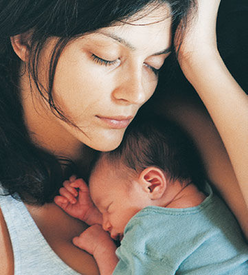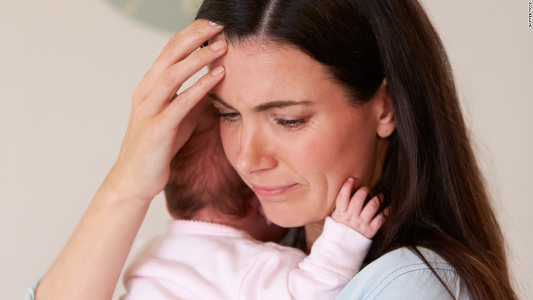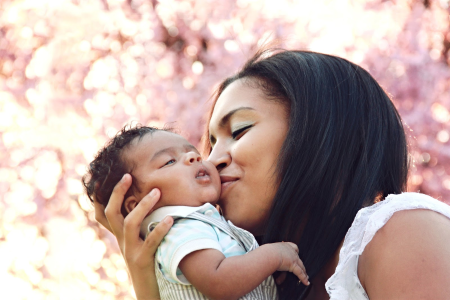Postpartum Support: Your New Life as a Parent

So you’ve been a parent for three or four weeks, which means by now you’ve likely endured sleepless nights, round-the-clock feedings, diaper changes, blowout clean-ups, and sticky spit-up situations.
Also during these last few weeks, you’ve hopefully enjoyed lots of snuggling, delicious new baby smells, and the delightful calm that comes only from rocking a tiny baby to sleep.
Motherhood is still relatively new, but hopefully by now you’re starting to settle into your new role as the actual parent of a tiny human.
Whoa.
While incredibly exciting (and exhausting), you’re definitely still VERY MUCH in transition mode right now. This means you’re just learning how to multitask and balance this new life of yours: figuring out how to take care of your brand new baby and trying to maintain your relationship with your partner (if you have one).
Oh yeah, and yourself.
Your body, omg. It’s been through so much. If this is your first time, it’s uncharted territory (don’t worry, it’s much easier the next time!). You might feel like it will never quite be the same. And maybe it won’t. And then there are your emotions. You’re probably feeling the feels at a whole new level (the sleep deprivation isn’t helping).
It may seem that everyone else’s lives are going on as usual. Part of you may even feel some jealousy over a partner who’s returned to work and gets to eat lunch and use the bathroom without a care in the world! You may feel like you don’t belong anymore, especially if many of your friends don’t have kids. You may feel like they won’t want to hang out with you anymore now that there’s a baby in the equation. And while your co-workers may not be your absolute favorite people in the world, they used to be a part of your daily life — you may even miss them too. Or at least, the familiarity of their company.
For many, having a baby changes everything. In ways you never expected, perhaps.
I remember so vividly in the months after my first child was born, friends (who didn’t yet have kids) would come to visit me and meet the baby. I loved seeing them, but when they’d leave this feeling of intense jealousy would wash over me; they got to leave my house–they had freedom! They could do whatever they wanted: go see a movie, take a yoga class, eat at a restaurant. But not me. I felt trapped– truly stuck in my home –and even though I loved my baby so much, I didn’t love the loss of freedom (or “me time” time) I once had.
Though some people slip easily into parenthood like a pair of well-worn, perfectly-fitting jeans, many others (myself included) find this transition extremely challenging — kind of like trying to shove your post-pregnancy size 9 feet into your favorite size 8 boots.
If this is you, you’re not alone.

Perhaps you’re feeling ashamed about this — I mean, you’re “supposed to” loooooove being a parent, right? You’re “supposed to” think your baby is the best thing since sliced bread, and want to spend every waking second staring into her beautiful baby eyes and smelling her sweet baby breath. And what about all those strangers at the store who tell you to cherish “every single moment” of this precious time because it “just goes by so fast?”… Meanwhile, you’re literally counting the seconds until your partner gets home from work so you can hand the baby over and take some much needed time for yourself (aka a glorious five-minute nap until your presence is requested yet again).
It’s okay to feel these feelings — that in fact, while you love your baby, you don’t love every single second of new motherhood. You are exhausted. You used to have all this time to yourself — time to see friends, work out, do whatever it is you love to do — and you used to have control.
For now, “me time” is a distant memory.
You may feel like you’ve lost a part of yourself and you don’t know who you are anymore. Not having many clothes that fit certainly doesn’t help either!
Some of you may be a little further over into PPD territory… you may even be feeling weepy and sad, or angry. Or perhaps you’re feeling a little anxious. Maybe you’re wondering why you ever decided to have a baby in the first place. Maybe you are having intrusive thoughts — thoughts that scare the you-know-what out of you and urge you to never, ever, walk down the stairs while holding your baby for fear you might drop her. If this is you, you aren’t alone. (Want proof? Read about my PPD experience here.)
These are the thoughts and feelings you may not want to share with anyone — not your friends, not your family, and certainly not your OBGYN at your six-week postpartum appointment.

At the same time, you may be longing to talk about these things, because maybe it would help you feel connected, supported, and less alone … but you are terrified to do so. You’re afraid of judgment (“you’re having a hard time?? This is the best time of your life! You have a new baby!”). You may be scared your doctor will think you’re an unfit mother, or that if you voice your sentiments out loud, it will make them that much more real and true.
If this is you (and this was definitely me), let me reiterate: you are not alone.
It is OK not to love every single second of new motherhood. Hell, it’s OK to not love a lot about new motherhood. This does not make you a bad mom who doesn’t love her baby.
Whether you’re a new mom experiencing the baby blues and/or the typical highs and lows of new parenthood, or you are struggling with more serious postpartum mental health concerns such as postpartum depression or anxiety, there are resources out there for you.
First and foremost, even if you are nervous about doing so, it is important to discuss any concerns you have with your doctor (either your OB, your primary care doctor, or a mental health professional – whichever you prefer).
You are the best advocate for your own health. If you feel you are not adjusting well to new parenthood and are experiencing symptoms that are leading you to feel hopeless and helpless more often than not, please let your OB or family physician know, and ask about scheduling an appointment.
According to Postpartum Support International, 10 percent of women experience depression during pregnancy, and 15 to 20 percent of women experience significant depression following childbirth, while six percent of women experience anxiety during pregnancy, and 10 percent of women experience anxiety following childbirth. As it turns out, perinatal depression is actually “the most common complication of childbirth.”
Perinatal mood and anxiety disorders can occur any time within the first year of parenthood, and certainly don’t discriminate; they can affect people of every race, gender, culture and socioeconomic status. That said, according to Postpartum Support International, “the percentages are even higher for women who are also dealing with poverty, and can be twice as high for teen parents.” Here’s a rundown of risk factors that may make certain people more vulnerable to developing a perinatal mood and anxiety disorder.
We discuss some of the key differences between the baby blues and more invasive, persistent perinatal mood and anxiety disorders here. You can also check out Postpartum Support International to learn more about various perinatal mood and anxiety disorders, risk factors, and symptoms.
New parenthood is a challenging time, and whether you are struggling with the transition of becoming a parent, experiencing the baby blues, or think you may be suffering from a more severe perinatal mood and/or anxiety disorder, it’s important that you feel supported, validated, and have someone who will listen to you.
Other moms are a great resource for this! Check out our piece on the importance of connecting with other moms. We also offer tips on exactly how and where to meet these other moms. In the meantime, definitely reach out to your family and friends for support.
Here are some other resources that can help:
Postpartum Support International (PSI) Helpline — Anyone can call the Helpline toll-free, 24/7, at 1-800-944-4773. You’ll be prompted to leave a message, and a volunteer will return your call as soon as possible (Helpline messages are returned daily). According to PSI, “The volunteer will give you information, encouragement, and names of resources near you.”
Postpartum Stress Center — This group has excellent information and resources; Read these through with your family or partner, and help them understand how you’re feeling.
If you have more immediate needs (i.e. suicidal thoughts) and need to speak with someone right now, here are the numbers you need:
National Suicide Prevention Lifeline:
1-800-273-8255
Suicide Prevention Hotline:
1-800-273-8255 (1-800-SUICIDE)
National Postpartum Depression Hotline: (1-800-PPD-MOMS)
911
Hang in there, Mama. You’re doing great, even though you may not feel like it. Remember to take care of you: drink lots of water, rest if/when you can, and take five minutes just to yourself each and every day (your baby will be okay, I promise!).
Remember also — nothing is permanent. In the grand scheme of your life, this time period is but a tiny blip.

Soon we’ll talk about building your support network (i.e. other moms!), and the importance of getting out of the house.

Until then — take good care!!
Back to: Infancy Topics
Read Also: